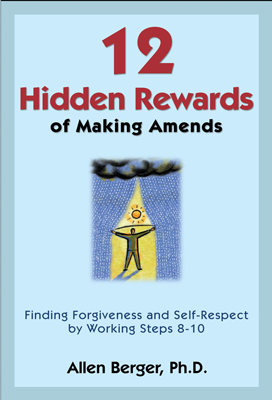The 12 Gifts from Working the Steps
An excerpt from
An Abridged Version of 12 Hidden Rewards of Making Amends
by Allen Berger, PhD., Hazelden Publishing
PART FOUR | Turning from an Ego-Based False Self to an Authentic Human Being
In Steps 8 and 9, we are going to shift our focus from self to others. We are going to focus on improving our relationships with others. First we will see how our false-self has harmed our relationships, and then we will go about the business of repairing them. Steps 8, 9, and 10 form the basis for our emotional well-being.
Here’s what makes this Step so challenging: we are being asked to break a basic rule of our false-self, which once demanded that we had to be perfect, that we had to be superhuman to be OK. Being human wasn’t enough; we had to become someone we were not. We had to be more than human. We rejected ourselves to become a fabricated-self. We became phonies, living behind a fabricated facade.
Dr. Nathaniel Branden (1994), one of the foremost authorities on self-esteem, identified six characteristics that people with high self-esteem possess. Taking responsibility was number one.
Immediately we see some of the benefits of Step 8. We are learning about forgiveness, what it takes to develop self-esteem, and how to stand on our own two feet. We are recovering our integrity. We are moving toward forgiving ourselves and others. We are moving to a place beyond right and wrong where we take responsibility for ourselves and our actions.

By examining our list, we can see a pattern in our destructive behavior. In Twelve Steps and Twelve Traditions, Bill Wilson described the process in the following way: While the purpose of making restitution to others is paramount, it is equally necessary that we extricate from an examination of our personal relations every bit of information about ourselves and our fundamental difficulties that we can. Since defective relations with other human beings have nearly always been the immediate cause of our woes, including our alcoholism, no field of investigation could yield more satisfying and valuable rewards than this one.
In Step 8, we became willing to make amends to those people we have harmed. Step 9 is about being sincere when we make amends. We are trying to restore social justice. What does this mean? It means that we restore the human rights of a person whom we have violated. If we are genuinely sincere, there is a chance that our amends will promote healing and make someone whole again.
When we make amends, we must acknowledge how deeply we have wounded others. They, our victims, were in no way responsible for what we had done to them. We cannot justify our rotten behavior. We did what we did because of who we were, not because of who they were.
Keeping a hold on the right reason for making amends can help us respond appropriately whether we are forgiven or not. If we make amends for the right reason, then a victim’s lack of forgiveness will not knock us off balance. We will give them room to respond in whatever way they need to. We will let them vent or tell us how they were hurt. We won’t interrupt them or insist they are wrong. We will honor and respect their feelings. We won’t impose any expectations or impose any judgment on their response; we will accept their reaction for what it is.
Each time we make amends, we resolve another piece of unfinished business. This has a very positive effect on our psyche. This energy now becomes available for living, for helping us deal more effectively with what’s happening in the present moment.


[…] PART ONE PART TWO PART THREE PART FOUR […]
[…] ONE PART THREE PART FOUR PART […]
[…] ONE PART TWO PART FOUR PART […]
[…] PART ONE PART TWO PART THREE PART FOUR […]